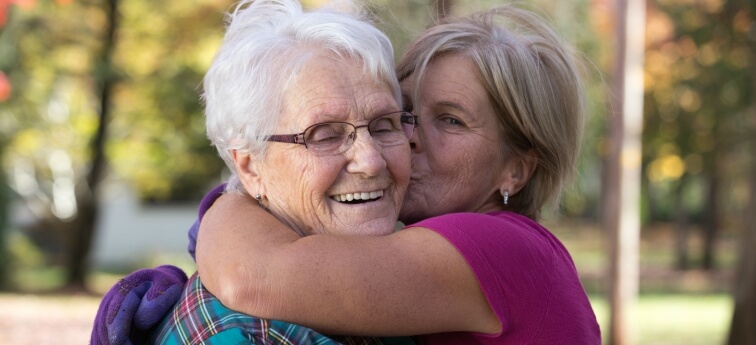
What You'll Learn

The warning signs of dementia can be subtle at first, especially if your parent lives on the other side of the country. By the time the signs become obvious, your parent may have moderate to advanced dementia and need extensive care. Recognizing the warning signs early can help you encourage your parent to get a proper diagnosis, begin planning for the future, and implement lifestyle changes that keep your parent safe while making their life easier.
What's the Difference Between Dementia and Normal Aging?
About 40 percent of people over 65 experience some memory loss. Brain cells die with age, and chronic medical conditions such as diabetes or high blood pressure can exacerbate this phenomenon.
Loss of independence or the ability to function or think clearly, however, is not a normal part of aging. A senior who begins making poor decisions, consistently struggles with memory loss, or develops personality changes or new mental health symptoms is not experiencing normal aging.
What Are Some Warning Signs of Dementia?
Any change in a loved one’s ability to think or make decisions warrants a conversation and a trip to the doctor. Some of the most common warning signs of Alzheimer’s include:
- Difficulty planning, solving problems, or completing basic tasks, such as finishing a familiar recipe.
- Memory loss that affects daily life. For instance, a senior might forget their keys so frequently that they no longer feel safe leaving their home alone.
- Confusing time or place, such as by thinking they are in a different time or location.
- Increasingly poor judgment.
- Forgetting familiar people.
Many people see Alzheimer’s and dementia as synonymous, but Alzheimer’s is just one manifestation of dementia. Symptoms of other types of dementia can include:
- Memory loss or thinking changes associated with a cardiovascular problem, such as stroke or high blood pressure.
- Word-finding difficulties.
- Difficulty reading, writing, or understanding language.
- Sudden changes in personality. For example, a once reserved senior might become impulsive or aggressive.
- New or worsening mood issues, such as anxiety or depression.
- Changes in movement. Seniors with Parkinson’s may shake, while those with frontotemporal dementia may have a slow or unsteady gait.
Can Dementia Change a Person’s Personality?
Memory loss isn’t the only sign of dementia. Some forms of dementia, such as frontotemporal dementia, are characterized by changes in mood and personality. No matter which type of dementia a senior has, their personality may change. Cognitive difficulties can make seniors more reserved and anxious. As dementia progresses and damages the brain, it can affect the parts of the brain that play a role in personality. For some seniors, this is the first sign of dementia.
Could My Loved One Be Faking Dementia?
No one wants to believe that their loved one has dementia, and because no single test can conclusively diagnose all forms of dementia, it can be difficult to get an accurate diagnosis. Thus, many people believe that their loved one might be faking. A number of unique dementia features can compound this belief. Those include:
- The fact that dementia is inconsistent. A person may be better on some days and worse on others.
- Personality changes associated with dementia. You might mistakenly believe that the problem is depression, or that your loved one is being manipulative.
- Dementia tends to get worse at night. This is called sundowning.
Are There Other Conditions That Can Cause Symptoms of Dementia?
Some medical conditions may mimic symptoms of dementia. This is why it’s so important to see a doctor and get an accurate diagnosis. Some conditions that may be confused with dementia include:
- Depression.
- Drug side effects, especially with drugs that tend to slow down brain activity, such as benzodiazepines.
- Head injury, especially following a fall.
- Infections of the brain or spinal cord.
- Brain tumors.
What Can I Do to Make My Loved One’s Life Easier?
Dementia does not mean the end of an active, fulfilling life. Dementia is a progressive disease, so many seniors are able to live independently for months or years following a diagnosis. Others need more immediate help. Providing your loved one with a supportive, safe environment that is not excessively restrictive is key to helping them remain happy and healthy. The right senior living community can support your loved one and help them continue using their natural gifts.
Some other strategies to help your loved one include:
- Being patient and sympathetic.
- Helping them talk about their feelings.
- Encouraging them to remain physically active.
- Helping them find simple activities they enjoy, such as gardening or painting.
- Listening to music from their youth.
- Not correcting them when they make a mistake.
If you need help supporting a loved one with dementia, check out our Caregiver’s Complete Guide to Alzheimer’s and Dementia Care.


